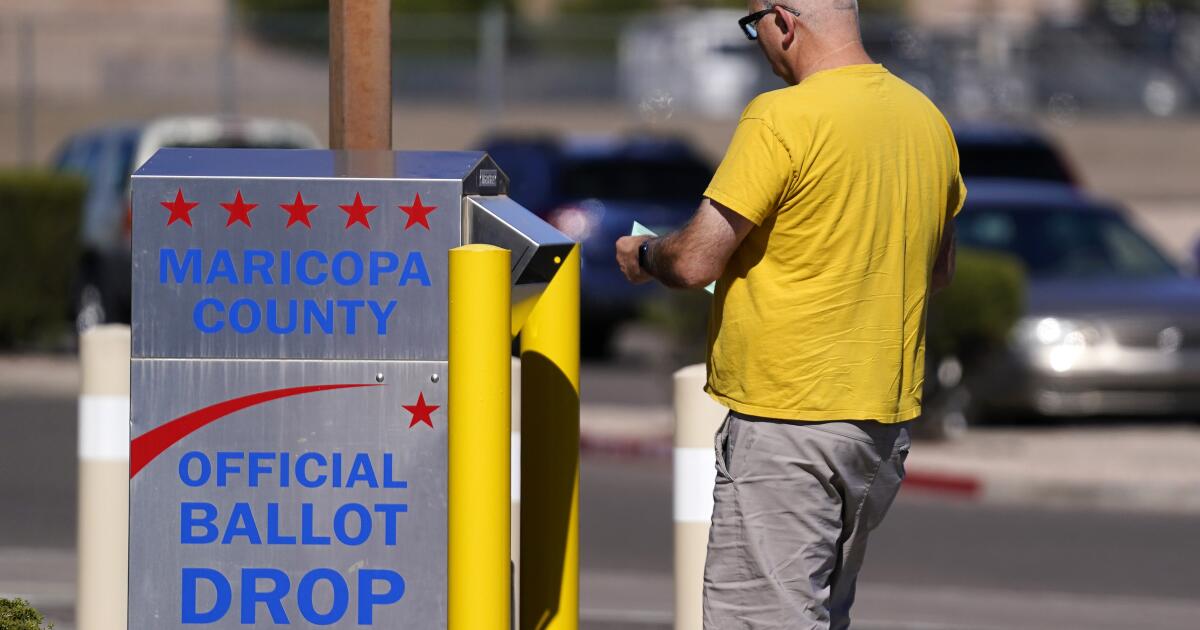If you needed just one fact to show that in the world’s greatest democracy one of the two major parties is perversely devoted to suppressing and even subverting the vote, you couldn’t do better than this: The senior counsel for the Republican National Committee’s “election integrity team” — Orwellian doublespeak come to life — is a criminal defendant in Arizona’s case against 18 Republicans who tried to overturn the state’s 2020 vote for Joe Biden.
But there are so many more such facts, alas, and they provoke trepidation about postelection chaos of the sort that Donald Trump and his party unleashed four years ago.
As a Republican involved in pre-Trump presidential contests put it to me, when it comes to support for our electoral system, “Trump has taken the party to a bad place.”
Dangerously for democracy, Republicans’ belief in systemic fraud by Democrats is now an article of faith. Witness the elected officials in 2024 still dodging reporters’ questions about who won in 2020, for fear of angering Trump and worshipful party voters. “All they want to do is cheat,” Trump said of Democrats at a recent Wisconsin rally. Ominously, two-thirds of Republicans say they’d trust Trump about whether to accept the results next month, far more than they’d trust a government-certified outcome, according to an August poll from the Associated Press and NORC Center for Public Affairs Research.
Since 2020, red states have enacted voting restrictions under the guise of “election integrity,” though fraud is all but nonexistent. They’ve imposed new identification requirements and limited mail-in ballots, drop boxes and just about any measure aiming to expand participation and provide convenience for harried Americans — and especially for minorities, college students, big-city voters and generally any groups that lean Democratic. Drop boxes have been a target of Republicans especially in Wisconsin, where U.S. Senate candidate Eric Hovde asked at a campaign event, “Who’s watching to see how many illegal ballots are being stuffed?”
Already millions of voters have cast early ballots, just as state and national Republican groups are pursuing scores of lawsuits nationwide contesting local and state election rules and practices, including about how those early mail-in ballots are counted. They want to throw out some on technicalities, such as failing to date an envelope, that have nothing to do with the ballots’ integrity, and trash any that arrive after election day although they’re postmarked before it.
Republicans are fighting to restrict mail-in ballots even as the party presses its own supporters to vote that way. That’s in keeping with Trump’s false claims that such voting is “corrupt.” Why? Simply because most mail-in votes are from Democrats. In battleground Pennsylvania, for example, Democrats are requesting more than twice as many mail ballots as Republican voters are.
Many of the lawsuits and other challenges before local election boards and legislative bodies won’t succeed, election experts agree, just as the scores of lawsuits filed after Trump’s 2020 defeat failed all the way up to the Supreme Court. On Monday, the justices rejected a petition from Republican secretaries of state, members of Congress and Pennsylvania state lawmakers opposing as unconstitutional a modest executive order from Biden; its provisions include time off for federal employees who wish to volunteer as much-needed nonpartisan poll workers.
But some challenges will prevail. Meanwhile, the legal fights keep election lawyers playing Whac-A-Mole, and leave voters and local administrators perplexed about just what the rules are. What’s different from 2020, and worrisome, is that Trump’s grassroots allies have had years since then to heed his wingman Steve Bannon’s 2021 call to capture control of election boards where votes are first counted and certified: “We’re going to take this back … precinct by precinct.”
The head of one such board in Michigan’s bellwether Macomb County is a Republican who implored Trump to fight to stay in office in 2020. A Republican on a North Carolina county board has made evidence-free claims that Democrats are trafficking in illegal votes. And Republican officials in some Pennsylvania counties have opposed certifying results in past elections. Those are among the findings of a Reuters review of swing-state election administrators.
Such election skeptics likely won’t determine next month’s result, but they could foul up the works by refusing to certify votes for Kamala Harris in the short term and, for the long term, further undermine confidence in voting.
Pennsylvania and Georgia, two of the most hard-fought prizes for Trump and Harris, are the states that most worry election experts. MAGA loyalists are in place in Georgia at the state and county level. They control the state board and have authorized county officials to withhold vote certifications for any “reasonable inquiry” they might conjure; ordered that ballots be counted by hand, a time-consuming and mistake-prone practice; and insisted on naming vote monitors for Democratic-leaning Fulton County, home to Atlanta and a plurality of Black residents. Democrats and voting groups are suing.
But here’s the good news: This time Trump isn’t the president, capable of abusing his power to, say, order the Justice Department to intervene or the Pentagon to seize voting machines. And JD Vance won’t be the vice president who presides when Congress certifies the result next Jan. 6.
Let’s keep it that way for the next four years.
@jackiekcalmes
